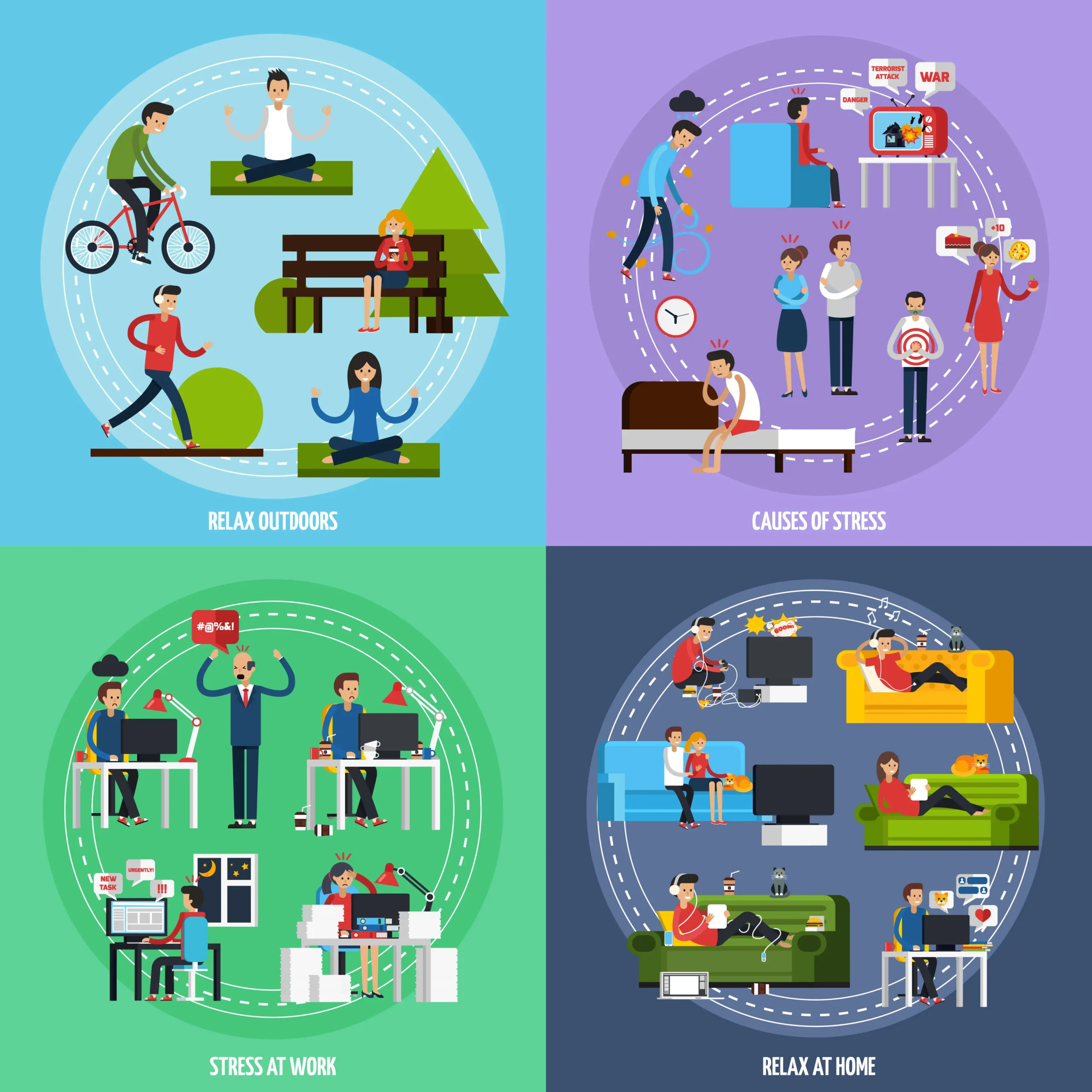
Lifestyle Guide: The Complete Manual for Leading the Best Possible Life
What is Lifestyle?
Your lifestyle is the way you live your life. It includes your daily habits, choices, and routines. Your general health and well-being can be profoundly affected by your lifestyle.
Table of Contents
ToggleThe Importance of Lifestyle
Your lifestyle is important because it can affect your physical, mental, and emotional health. A healthy lifestyle can help you reduce your risk of chronic diseases, improve your mood and energy levels, and boost your self-esteem.
How to Improve Your Lifestyle
Your lifestyle is the way you live your life. It includes your daily habits, choices, and routines. Your lifestyle can have a significant impact on your overall health, well-being, and happiness.
You may enhance your lifestyle in a lot of ways. Here are a few tips:
Healthy Eating
Eating a healthy diet is one of the most important things you can do to improve your lifestyle. A healthy diet provides your body with the nutrients it needs to function properly and to stay healthy.
Consuming a wide range of fruits, vegetables, and whole grains is the key to a nutritious diet. Pick lean protein sources including tofu, beans, fish, and poultry. Limit processed foods and sugary drinks.
Regular Exercise
Another essential element of a healthy lifestyle is regular exercise. Exercise helps to improve your cardiovascular health, strengthen your muscles and bones, and reduce your risk of chronic diseases.
On most days of the week, try to get in at least 30 minutes of moderate-intensity exercise. Look for hobbies or interests that suit your lifestyle. Some examples of moderate-intensity exercise include walking, running, biking, swimming, and dancing.
Adequate Sleep
Sleep is essential for good health. When you don’t get enough sleep, you are more likely to experience problems with your mood, concentration, and energy levels. You are also more likely to develop chronic diseases, such as heart disease, stroke, and diabetes.
Adults typically require 7-8 hours of sleep every night. Create a regular sleep routine and try your best to follow it, especially on the weekends. Establish a calming evening ritual to assist you in de-stressing before bed.
Stress Management
Stress is a normal part of life, but too much stress can have a negative impact on your health. Heart disease, high blood pressure, depression, anxiety, and other issues can be brought on by ongoing stress.
To manage stress in a healthy way, it is crucial to find and maintain it. Some examples of healthy stress-management techniques include exercise, yoga, meditation, and spending time in nature.
Positive Relationships
Having pleasant and satisfying relationships is essential for living and having a positive lifestyle. Spending time with loved ones can help to reduce stress, improve your mood, and boost your self-esteem.
Spend quality time with the individuals that matter most to you and take care of your connections. This may involve spending time together in person, talking on the phone, or simply sending a text message.
Improving your lifestyle takes time and effort, but it is worth it. By making healthy choices, you can reduce your risk of chronic diseases, improve your mood and energy levels, and live a happier and more fulfilling life.

Different Types of Lifestyles
There is an extensive range of lifestyles, all of which have particular benefits and disadvantages. Here are a few examples:
Active Lifestyle
An active lifestyle is one that prioritizes regular exercise. People who live an active lifestyle may enjoy participating in sports or other physical activities.
Benefits: An active lifestyle can help to reduce the risk of chronic diseases, improve cardiovascular health, and boost energy levels.
Challenges: It can be difficult to maintain an active lifestyle if you have a busy schedule or if you live in a climate with extreme weather conditions.
Healthy Lifestyle
A healthy lifestyle is one that makes choices that promote overall health and well-being. This might involve having a balanced diet, working out frequently, and obtaining adequate rest.
Benefits: A healthy lifestyle can help to reduce the risk of chronic diseases, improve mood and energy levels, and extend lifespan.
Challenges: It can be difficult to maintain a healthy lifestyle if you are surrounded by unhealthy temptations or if you have limited access to healthy foods and resources.
Balanced Lifestyle
A balanced lifestyle is one that strives to find a healthy equilibrium between work, play, and rest. People who live a balanced lifestyle make time for the things that are important to them, such as their career, family, friends, and hobbies.
Benefits: A balanced lifestyle can help to reduce stress, improve mental health, and promote overall well-being.
Challenges: It can be difficult to find time for everything when you have a busy schedule. It is important to be realistic about your priorities and to make time for the things that are most important to you.
Minimalist Lifestyle
A minimalist lifestyle is one that focuses on living with less. People who live a minimalist lifestyle may declutter their homes and possessions in order to focus on the things that are most important to them.
Benefits: A minimalist lifestyle can help to reduce stress, save money, and free up time for more important things.
Challenges: It can be difficult to declutter your possessions, especially if you have a sentimental attachment to them. It is important to be mindful of your reasons for keeping or getting rid of things.
Sustainable Lifestyle
A sustainable lifestyle is one that makes choices that minimize the impact on the environment. This may include recycling, composting, and using energy-efficient appliances.
Benefits: A sustainable lifestyle can help to protect the environment and reduce your carbon footprint.
Challenges: It can be difficult to make sustainable choices, especially if they are more expensive or inconvenient. It is important to find sustainable choices that fit your budget and lifestyle.

Additional Tips for Improving Your Lifestyle
Financial well-being
Your financial well-being is important for your overall health and well-being. When you are financially stable, you are less stressed and more likely to be able to afford the things you need and want.
Tips for managing your finances
- Create a budget and track your spending. This will help you to see where your money is going and to make sure that you are not spending more than you earn.
- Pay off your debt as quickly as possible. Debt can be a major source of stress and financial hardship.
- Put money aside for later. Even a modest monthly savings will build up over time if you can manage it.
- Invest your money wisely. Investing can help you to grow your wealth over time and to reach your financial goals.
How to achieve your financial objectives and save money
- Set financial goals. With your money, what goals do you want to accomplish? You can begin creating a plan to achieve your goals as soon as you are aware of them.
- Create a budget. A budget will help you to track your spending and to make sure that you are saving enough money to reach your goals.
- Cut back on unnecessary expenses. Examine your spending patterns carefully to identify areas where you may make savings. Maybe you could cancel any unwanted subscriptions or make more meals at home rather than going out to dine.
- Increase your income. If you can, try to increase your income by getting a raise or starting a side hustle.
Career satisfaction
A fulfilling career is important for your overall well-being. When you enjoy your work, you are more likely to be happy and motivated. Additionally, your chances of career success are higher.
Tips for finding a fulfilling career
- Think about your interests and skills. What are you passionate about? What are you good at? Once you have a good understanding of your interests and skills, you can start to look for careers that are a good fit.
- Do your research. Learn about different careers and industries. Talk to people who work in different careers to get their insights.
- Get experience. Internships and volunteer work are great ways to gain experience in different fields.
- Talk to people in your field and build relationships. Networking can help you to learn about job opportunities and to get your foot in the door.
How to reach your objectives and progress in your profession
- Set career goals. What do you want to achieve in your career? You can begin creating a plan to achieve your goals as soon as you are aware of them.
- Develop your skills. Take classes, attend workshops, and read books to develop your skills.
- Take on new challenges. Volunteer for new projects and assignments. This will help you to learn new skills and to demonstrate your abilities.
- Be a team player. Be supportive of your colleagues and be willing to help out.
- Network with people in your field. Participate in industry gatherings and establish connections on LinkedIn. Networking can help you to learn about job opportunities and to advance your career.
Personal development
Personal development is the process of improving oneself over time. It involves learning new skills, gaining new knowledge, and developing new habits.
Tips for continuous learning and growth
- Read books and articles. Reading is a fantastic method to increase your knowledge and discover new things.
- Take classes and workshops. This is a fantastic approach to network and pick up fresh skills.
- Attend conferences and events. This is a great way to learn about new trends and to network with people in your field.
- Find a mentor. As you strive toward your objectives, a mentor will provide direction and encouragement.
How to establish and meet your own objectives
- Set specific, measurable, achievable, relevant, and time-bound goals.
- Break down your goals into smaller steps. They will appear more attainable and less intimidating as a result.
- Create a plan for how you will reach your goals.
- Track your progress and make adjustments as needed.
- Celebrate your successes along the way.
Mental health
The importance of mental and physical wellness is equal. When you have good mental health, you are able to think clearly, manage your emotions, and cope with stress.
Tips for maintaining good mental health
- Get enough sleep. Adults typically require 7-8 hours of sleep every night.
- Have a balanced diet. Consuming wholesome food provides your body with the energy it requires to operate as expected.
- Exercise regularly. Endorphins are released during exercise and are known to improve mood. Spend time in nature. Being in nature has been shown to reduce stress and improve mood.
- Connect with others. Strong social connections are important for good mental health. Spend quality time with the individuals that matter most to you and take care of your connections.
- Practice mindfulness. The practice of mindfulness involves focusing attention on the current moment without passing judgment. Mindfulness can be achieved in a variety of methods, including yoga, meditation, and just spending a short period of time each day focusing on your breathing.
- Seek professional help if needed. If you are struggling with your mental health, don’t be afraid to seek professional help. A therapist can assist you in creating a treatment plan and teach you coping skills.
How to handle sadness, anxiety, and stress
Mental health issues like stress, anxiety, and depression are prevalent. If you are experiencing any of these problems, there are things you can do to cope.
Tips for coping with stress
- Identify your stressors. What aspects of your life cause you stress? Once you are aware of your stressors, you can begin to create coping mechanisms.
- Take care of yourself. Make sure you consume a balanced diet, exercise frequently, and get adequate sleep. Taking care of yourself will help you to be more resilient to stress.
- Learn relaxation techniques. Stress and anxiety can be decreased by practicing relaxation techniques like deep breathing and meditation.
- Connect with others. Talking to friends, family, or a therapist can help you to cope with stress.
Tips for coping with anxiety
- Identify your triggers. What specific situations make you anxious? Once you know your triggers, you can start to develop strategies for avoiding or coping with them.
- Challenge your negative thoughts. Anxiety often involves negative thoughts and worries. Challenge these thoughts and replace them with more realistic and positive thoughts.
- Practice relaxation techniques. Relaxation techniques such as deep breathing and meditation can help to reduce anxiety.
- Seek professional help if needed. If your anxiety is severe or interfering with your daily life, seek professional help from a therapist.
Tips for coping with depression
- Talk to someone you trust. Talking to a friend, family member, therapist, or another trusted person can help you to cope with depression.
- Get regular exercise. Endorphins are released during exercise and are known to improve mood.
- Eat a healthy diet. Consuming wholesome food provides your body with the energy it requires to operate as intended.
- Get enough sleep. Adults typically require 7-8 hours of sleep every night.
- Seek professional help if needed. If your depression is severe or interfering with your daily life, seek professional help from a therapist or psychiatrist.
Physical health
Your mental and physical well-being are equally vital. When you are physically healthy, you are able to function at your best.
Tips for preventing chronic diseases
- Eat a healthy diet. Consume a lot of whole grains, fruits, and veggies. Minimize sugar-filled beverages, processed foods, and harmful fats.
- Exercise regularly. On most days of the week, try to get in at least 30 minutes of moderate-intensity exercise.
- Maintain a healthy weight. Numerous chronic illnesses, including heart disease, stroke, and type 2 diabetes, are at risk due to obesity.
- Don’t smoke. One of the most avoidable causes of death is smoking.
- Limit alcohol consumption. Drinking too much alcohol can harm your liver and other organs.
How to stay healthy at any age
As you age, it is important to make some changes to your lifestyle to stay healthy. Here are a few tips:
- Get regular check-ups and screenings. This will assist in detecting any possible health issues at an early stage when they are most responsive to treatment.
- Maintain your healthy diet and frequent workout regimen. This is important for maintaining good physical health at any age.
- Be mindful of your mental health. Stress, anxiety, and depression can all have a negative impact on your physical health. If you are struggling with any of these problems, seek professional help.
- Stay connected with others. Social connections are important for good mental and physical health. Spend quality time with the individuals that matter most to you and take care of your connections.
Improving your lifestyle takes time and effort, but it is worth it. By making healthy choices, you can reduce your risk of chronic diseases, improve your mood and energy levels, and live a happier and more fulfilling life.

How to Live a Fulfilling Lifestyle
Living a fulfilling lifestyle is about finding what works for you and making choices that promote your overall health, well-being, and happiness. Here are a few tips:
Find Your Purpose
What are you passionate about? What goals do you have for your life? Once you know your purpose, you can start to live your life in alignment with it.
Benefits: Having a sense of purpose can give your life meaning and direction. Additionally, it might support your motivation and goal-focused persistence.
Challenges: It can be difficult to find your purpose in life. It may take some time and self-reflection to figure out what you are passionate about and what you want to achieve.
Set Goals
Setting and achieving objectives keeps you motivated and gives you something to aim for. Ensure that your objectives are clear, quantifiable, doable, pertinent, and have a deadline.l
Benefits: Setting goals can help you to achieve your full potential and live a more fulfilling life.
Challenges: It can be difficult to set realistic and achievable goals. It is important to be honest with yourself about your strengths and weaknesses.
Take Action
Don’t wait for things to happen while you sit there. Make things happen by moving toward your goals.
Benefits: Taking action is essential for achieving your goals. It is the only way to move forward and make progress.
Challenges: It can be difficult to take action, especially if you are feeling overwhelmed or unsure. It is important to start small and to celebrate your successes along the way.

Celebrate Your Successes
Celebrate your accomplishments, no matter how minor they may appear. This will support your continued motivation and onward motion.
Benefits: Celebrating your successes can help to boost your self-esteem, increase your motivation, and make you feel more confident in your ability to achieve your goals.
Challenges: It can be difficult to celebrate your successes if you are used to being critical of yourself. It is important to be kind to yourself and to recognize your accomplishments, no matter how small they may seem.

Your Enriched Lifestyle Guide
Congratulations on reaching the end of our comprehensive guide to an enriched lifestyle. Your journey to elevate your daily experiences, well-being, and personal fulfillment is officially underway.
Throughout this article, we’ve equipped you with knowledge, strategies, and actionable steps to create a lifestyle that aligns with your goals and desires. From prioritizing health and well-being to achieving work-life balance, nurturing relationships, pursuing passions, managing finances, and exploring the world, you’ve gained insights to enrich your life.
But remember, knowledge alone is not enough. Your enriched lifestyle depends on taking action. As you move forward, make sure to:
- Prioritize your health, both physically and mentally.
- Seek harmony between your professional and personal life.
- Invest in personal development and self-improvement.
- Cultivate meaningful relationships and social connections.
- Pursue your passions and hobbies for enjoyment.
- Explore the world and broaden your horizons.
- Manage your finances wisely and set financial goals.
- Create a comfortable and aesthetically pleasing living environment.
Your path to an enriched lifestyle is filled with possibilities, and it starts now. As you implement the insights and strategies you’ve gained, you’ll discover that every step you take brings you closer to a life that’s truly fulfilling.
Thank you for joining us on this journey. We wish you success, happiness, and fulfillment as you embark on the path to an enriched lifestyle.
You may consider to read more about lifestyle. Keep visiting our site for new topic and you may find valuable one.
For More Articles Check Out Here

